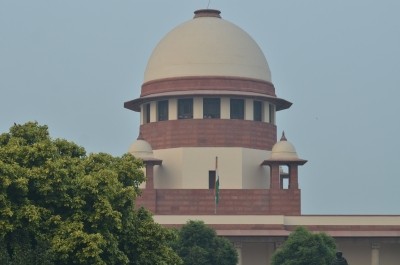
New Delhi, The Supreme Court on Tuesday said Parliament should provide clarity on the kind of protection regarding the status of individuals, who are forced to choose one among newly-reorganised states, and ensure that they are not worse off as a result of the reorganisation.
Justice S. Ravindra Bhat said: "In my considered opinion, given that states reorganisations occur as a consequence of political demands, or as an articulation of regional aspirations, there is no agency of the individual (i.e., members of Scheduled Caste or Scheduled Tribe communities) in such eventuality."
He noted that this situation is radically different from one, where a member of such a community voluntarily seeks opportunities outside her or his state - in which case, the rule in Marri Chandra Shekhar Rao (judgment) would apply.
Justice Bhat said: "There is, consequently, an obligation on the part of Parliament, to provide clarity about the kind of protection, regarding the status of such individuals forced to choose one among the newly reorganised states, and ensure that they are not worse off as a result of reorganisation."
He wrote a separate judgment while concurring with a judgment pronounced by a bench comprising Justices U.U. Lalit and P.S. Narasimha, as the top court set aside a judgment passed by the division bench of the Jharkhand High Court, which said the appellant was not belonging to the reserved category of STs for the purposes of limited departmental examination, as he failed to produce a caste certificate by any of the competent authorities.
After Bihar was bifurcated as a result of Bihar Reorganization Act, 2000, the appellant's service was allocated to successor state Jharkhand and since then, he had been working there. He was declared unsuccessful in the limited departmental examination, the result for which was declared in May 2013, for ST category. In the results of the examination, the appellant was declared unsuccessful though he had secured 123.68 marks as against the cut-off at 113.70 for ST category.
The state government said as per condition No 13 of the advertisement, issued in 2010, the caste certificate, as well as the proof of residence had to be obtained from Sub-Divisional Magistrate posted within the jurisdiction of Jharkhand, and as the appellant having failed to comply with such requirement, he could not be considered as a candidate belonging to the reserved category in Jharkhand.
Petitioner Akhilesh Prasad submitted that the limited competitive examination could not be construed to be a fresh appointment and rather it was a case of promotion to the higher post. He said he was already in the service under Jharkhand government and he was entitled to offer his candidature as a candidate belonging to ST category.
Justice Bhat pointed out that a situation may arise, where caste is not designated as a Scheduled Caste in one of the newly reorganised states, where the individual is forced to locate; or where the children of the concerned individual were studying in state A, and the parent was in state B (and continued to be so) and in the former state, the concerned caste is not notified as a scheduled caste-or, even that the children are not treated as "belonging to" that state, etc.
He emphasised that each needs to be examined.
"Furthermore, the duty to provide clarity and protection, generally speaking has to be consistent - i.e., in the case of one states' reorganisation, the protection should not be greater than in the case of reorganisation of another state. That would defeat the command of Articles 14 and 15 (1) (i.e., in the latter case, there can possibly be discrimination on the ground of place of birth)," Justice Bhat added.
He emphasised that the duty of Parliament, in such cases, is a constitutional obligation, to ensure that no one individual or group is disadvantaged.
"In my opinion, given that determination of whether a community or caste has to be notified as Scheduled Caste, or Tribe, is in relation to a state or Union Territory (i.e., it is primarily people-centric having regard to the existing geo-political unit), and when a determination is so made that a particular community belongs to such state, in the event of re-organisation, then, Parliament has a duty to provide clarity by way of express provision," said Justice Bhat.


.jpeg)

